- Home
- Gaston Leroux
Le mystère de la chambre jaune. English Page 14
Le mystère de la chambre jaune. English Read online
Page 14
CHAPTER XIII. "The Presbytery Has Lost Nothing of Its Charm, Nor theGarden Its Brightness"
A week after the occurrence of the events I have just recounted--onthe 2nd of November, to be exact--I received at my home in Paris thefollowing telegraphic message: "Come to the Glandier by the earliesttrain. Bring revolvers. Friendly greetings. Rouletabille."
I have already said, I think, that at that period, being a youngbarrister with but few briefs, I frequented the Palais de Justice ratherfor the purpose of familiarising myself with my professional duties thanfor the defence of the widow and orphan. I could, therefore, feel nosurprise at Rouletabille disposing of my time. Moreover, he knew howkeenly interested I was in his journalistic adventures in general and,above all, in the murder at the Glandier. I had not heard from him for aweek, nor of the progress made with that mysterious case, except by theinnumerable paragraphs in the newspapers and by the very brief notesof Rouletabille in the "Epoque." Those notes had divulged the fact thattraces of human blood had been found on the mutton-bone, as well asfresh traces of the blood of Mademoiselle Stangerson--the old stainsbelonged to other crimes, probably dating years back.
It may be easily imagined that the crime engaged the attention of thepress throughout the world. No crime known had more absorbed the mindsof people. It appeared to me, however, that the judicial inquiry wasmaking but very little progress; and I should have been very glad, if,on the receipt of my friend's invitation to rejoin him at the Glandier,the despatch had not contained the words, "Bring revolvers."
That puzzled me greatly. Rouletabille telegraphing for revolvers meantthat there might be occasion to use them. Now, I confess it withoutshame, I am not a hero. But here was a friend, evidently in danger,calling on me to go to his aid. I did not hesitate long; and afterassuring myself that the only revolver I possessed was properly loaded,I hurried towards the Orleans station. On the way I remembered thatRouletabille had asked for two revolvers; I therefore entered agunsmith's shop and bought an excellent weapon for my friend.
I had hoped to find him at the station at Epinay; but he was not there.However, a cab was waiting for me and I was soon at the Glandier. Nobodywas at the gate, and it was only on the threshold of the chateau that Imet the young man. He saluted me with a friendly gesture and threw hisarms about me, inquiring warmly as to the state of my health.
When we were in the little sitting-room of which I have spoken,Rouletabille made me sit down.
"It's going badly," he said.
"What's going badly?" I asked.
"Everything."
He came nearer to me and whispered:
"Frederic Larsan is working with might and main against Darzac."
This did not astonish me. I had seen the poor show MademoiselleStangerson's fiance had made at the time of the examination of thefootprints. However, I immediately asked:
"What about that cane?"
"It is still in the hands of Frederic Larsan. He never lets go of it."
"But doesn't it prove the alibi for Monsieur Darzac?"
"Not at all. Gently questioned by me, Darzac denied having, on thatevening, or on any other, purchased a cane at Cassette's. However,"said Rouletabille, "I'll not swear to anything; Monsieur Darzac has suchstrange fits of silence that one does not know exactly what to think ofwhat he says."
"To Frederic Larsan this cane must mean a piece of very damagingevidence. But in what way? The time when it was bought shows it couldnot have been in the murderer's possession."
"The time doesn't worry Larsan. He is not obliged to adopt my theorywhich assumes that the murderer got into The Yellow Room between fiveand six o'clock. But there's nothing to prevent him assuming that themurderer got in between ten and eleven o'clock at night. At that hourMonsieur and Mademoiselle Stangerson, assisted by Daddy Jacques, wereengaged in making an interesting chemical experiment in the part of thelaboratory taken up by the furnaces. Larsan says, unlikely as that mayseem, that the murderer may have slipped behind them. He has already gotthe examining magistrate to listen to him. When one looks closely intoit, the reasoning is absurd, seeing that the 'intimate'--if thereis one--must have known that the professor would shortly leave thepavilion, and that the 'friend' had only to put off operating tillafter the professor's departure. Why should he have risked crossing thelaboratory while the professor was in it? And then, when he had got intoThe Yellow Room?
"There are many points to be cleared up before Larsan's theory can beadmitted. I sha'n't waste my time over it, for my theory won't allow meto occupy myself with mere imagination. Only, as I am obliged for themoment to keep silent, and Larsan sometimes talks, he may finish bycoming out openly against Monsieur Darzac,--if I'm not there," added theyoung reporter proudly. "For there are surface evidences against Darzac,much more convincing than that cane, which remains incomprehensibleto me, all the more so as Larsan does not in the least hesitate to letDarzac see him with it!--I understand many things in Larsan's theory,but I can't make anything of that cane.
"Is he still at the chateau?"
"Yes; he hardly ever leaves it!--He sleeps there, as I do, at therequest of Monsieur Stangerson, who has done for him what MonsieurRobert Darzac has done for me. In spite of the accusation made by Larsanthat Monsieur Stangerson knows who the murderer is he yet affords himevery facility for arriving at the truth,--just as Darzac is doing forme."
"But you are convinced of Darzac's innocence?"
"At one time I did believe in the possibility of his guilt. That waswhen we arrived here for the first time. The time has come for me totell you what has passed between Monsieur Darzac and myself."
Here Rouletabille interrupted himself and asked me if I had brought therevolvers. I showed him them. Having examined both, he pronounced themexcellent, and handed them back to me.
"Shall we have any use for them?" I asked.
"No doubt; this evening. We shall pass the night here--if that won'ttire you?"
"On the contrary," I said with an expression that made Rouletabillelaugh.
"No, no," he said, "this is no time for laughing. You remember thephrase which was the 'open sesame' of this chateau full of mystery?"
"Yes," I said, "perfectly,--'The presbytery has lost nothing of itscharm, nor the garden its brightness.' It was the phrase which you foundon the half-burned piece of paper amongst the ashes in the laboratory."
"Yes; at the bottom of the paper, where the flame had not reached, wasthis date: 23rd of October. Remember this date, it is highly important.I am now going to tell you about that curious phrase. On the eveningbefore the crime, that is to say, on the 23rd, Monsieur and MademoiselleStangerson were at a reception at the Elysee. I know that, because I wasthere on duty, having to interview one of the savants of the Academy ofPhiladelphia, who was being feted there. I had never before seen eitherMonsieur or Mademoiselle Stangerson. I was seated in the room whichprecedes the Salon des Ambassadeurs, and, tired of being jostled by somany noble personages, I had fallen into a vague reverie, when I scentednear me the perfume of the lady in black.
"Do you ask me what is the 'perfume of the lady in black'? It mustsuffice for you to know that it is a perfume of which I am very fond,because it was that of a lady who had been very kind to me in mychildhood,--a lady whom I had always seen dressed in black. The ladywho, that evening, was scented with the perfume of the lady in black,was dressed in white. She was wonderfully beautiful. I could not helprising and following her. An old man gave her his arm and, as theypassed, I heard voices say: 'Professor Stangerson and his daughter.' Itwas in that way I learned who it was I was following.
"They met Monsieur Robert Darzac, whom I knew by sight. ProfessorStangerson, accosted by Mr. Arthur William Rance, one of the Americansavants, seated himself in the great gallery, and Monsieur Robert Darzacled Mademoiselle Stangerson into the conservatory. I followed. Theweather was very mild that evening; the garden doors were open.Mademoiselle Stangerson threw a fichu shawl over her shoulders and Iplainly saw that it was she who was begging Mons
ieur Darzac to go withher into the garden. I continued to follow, interested by the agitationplainly exhibited by the bearing of Monsieur Darzac. They slowly passedalong the wall abutting on the Avenue Marigny. I took the central alley,walking parallel with them, and then crossed over for the purpose ofgetting nearer to them. The night was dark, and the grass deadened thesound of my steps. They had stopped under the vacillating light of a gasjet and appeared to be both bending over a paper held by MademoiselleStangerson, reading something which deeply interested them. I stopped inthe darkness and silence.
"Neither of them saw me, and I distinctly heard Mademoiselle Stangersonrepeat, as she was refolding the paper: 'The presbytery has lost nothingof its charm, nor the garden its brightness!'--It was said in a tone atonce mocking and despairing, and was followed by a burst of such nervouslaughter that I think her words will never cease to sound in my ears.But another phrase was uttered by Monsieur Robert Darzac: 'Must I commita crime, then, to win you?' He was in an extraordinarily agitated state.He took the hand of Mademoiselle Stangerson and held it for a long timeto his lips, and I thought, from the movement of his shoulders, that hewas crying. Then they went away.
"When I returned to the great gallery," continued Rouletabille, "I sawno more of Monsieur Robert Darzac, and I was not to see him again untilafter the tragedy at the Glandier. Mademoiselle was near Mr. Rance,who was talking with much animation, his eyes, during the conversation,glowing with a singular brightness. Mademoiselle Stangerson, I thought,was not even listening to what he was saying, her face expressingperfect indifference. His face was the red face of a drunkard. WhenMonsieur and Mademoiselle Stangerson left, he went to the bar andremained there. I joined him, and rendered him some little servicein the midst of the pressing crowd. He thanked me and told me he wasreturning to America three days later, that is to say, on the 26th (theday after the crime). I talked with him about Philadelphia; he told mehe had lived there for five-and-twenty years, and that it was there hehad met the illustrious Professor Stangerson and his daughter. He dranka great deal of champagne, and when I left him he was very nearly drunk.
"Such were my experiences on that evening, and I leave you to imaginewhat effect the news of the attempted murder of Mademoiselle Stangersonproduced on me,--with what force those words pronounced by MonsieurRobert Darzac, 'Must I commit a crime, then, to win you?' recurred tome. It was not this phrase, however, that I repeated to him, when we methere at Glandier. The sentence of the presbytery and the bright gardensufficed to open the gate of the chateau. If you ask me if I believenow that Monsieur Darzac is the murderer, I must say I do not. I do notthink I ever quite thought that. At the time I could not really thinkseriously of anything. I had so little evidence to go on. But I neededto have at once the proof that he had not been wounded in the hand.
"When we were alone together, I told him how I had chanced to overheara part of his conversation with Mademoiselle Stangerson in the gardenof the Elysee; and when I repeated to him the words, 'Must I commit acrime, then, to win you?' he was greatly troubled, though much less sothan he had been by hearing me repeat the phrase about the presbytery.What threw him into a state of real consternation was to learn from methat the day on which he had gone to meet Mademoiselle Stangerson at theElysee, was the very day on which she had gone to the Post Office forthe letter. It was that letter, perhaps, which ended with the words:'The presbytery has lost nothing of its charm, nor the garden itsbrightness.' My surmise was confirmed by my finding, if you remember,in the ashes of the laboratory, the fragment of paper dated October the23rd. The letter had been written and withdrawn from the Post Office onthe same day.
"There can be no doubt that, on returning from the Elysee that night,Mademoiselle Stangerson had tried to destroy that compromising paper.It was in vain that Monsieur Darzac denied that that letter had anythingwhatever to do with the crime. I told him that in an affair so filledwith mystery as this, he had no right to hide this letter; that I waspersuaded it was of considerable importance; that the desperate tone inwhich Mademoiselle Stangerson had pronounced the prophetic phrase,--thathis own tears, and the threat of a crime which he had professed afterthe letter was read--all these facts tended to leave no room for me todoubt. Monsieur Darzac became more and more agitated, and I determinedto take advantage of the effect I had produced on him. 'You were onthe point of being married, Monsieur,' I said negligently and withoutlooking at him, 'and suddenly your marriage becomes impossible becauseof the writer of that letter; because as soon as his letter was read,you spoke of the necessity for a crime to win Mademoiselle Stangerson.Therefore there is someone between you and her someone who has attemptedto kill her, so that she should not be able to marry!' And I concludedwith these words: 'Now, monsieur, you have only to tell me in confidencethe name of the murderer!'--The words I had uttered must have struckhim ominously, for when I turned my eyes on him, I saw that his face washaggard, the perspiration standing on his forehead, and terror showingin his eyes.
"'Monsieur,' he said to me, 'I am going to ask of you something whichmay appear insane, but in exchange for which I place my life in yourhands. You must not tell the magistrates of what you saw and heard inthe garden of the Elysee,--neither to them nor to anybody. I swear toyou, that I am innocent, and I know, I feel, that you believe me; but Iwould rather be taken for the guilty man than see justice go astrayon that phrase, "The presbytery has lost nothing of its charm, nor thegarden its brightness." The judges must know nothing about that phrase.All this matter is in your hands. Monsieur, I leave it there; but forgetthe evening at the Elysee. A hundred other roads are open to you in yoursearch for the criminal. I will open them for you myself. I will helpyou. Will you take up your quarters here?--You may remain here to do asyou please.--Eat--sleep here--watch my actions--the actions of all here.You shall be master of the Glandier, Monsieur; but forget the evening atthe Elysee.'"
Rouletabille here paused to take breath. I now understood what hadappeared so unexplainable in the demeanour of Monsieur Robert Darzactowards my friend, and the facility with which the young reporter hadbeen able to install himself on the scene of the crime. My curiositycould not fail to be excited by all I had heard. I asked Rouletabille tosatisfy it still further. What had happened at the Glandier duringthe past week?--Had he not told me that there were surface indicationsagainst Monsieur Darzac much more terrible than that of the cane foundby Larsan?
"Everything seems to be pointing against him," replied my friend, "andthe situation is becoming exceedingly grave. Monsieur Darzac appears notto mind it much; but in that he is wrong. I was interested only inthe health of Mademoiselle Stangerson, which was daily improving, whensomething occurred that is even more mysterious than--than the mysteryof The Yellow Room!"
"Impossible!" I cried, "What could be more mysterious than that?"
"Let us first go back to Monsieur Robert Darzac," said Rouletabille,calming me. "I have said that everything seems to be pointing againsthim. The marks of the neat boots found by Frederic Larsan appear to bereally the footprints of Mademoiselle Stangerson's fiance. The marksmade by the bicycle may have been made by his bicycle. He had usuallyleft it at the chateau; why did he take it to Paris on that particularoccasion? Was it because he was not going to return again to thechateau? Was it because, owing to the breaking off of his marriage, hisrelations with the Stangersons were to cease? All who are interested inthe matter affirm that those relations were to continue unchanged.
"Frederic Larsan, however, believes that all relations were at an end.From the day when Monsieur Darzac accompanied Mademoiselle Stangerson tothe Grands Magasins de la Louvre until the day after the crime, he hadnot been at the Glandier. Remember that Mademoiselle Stangerson losther reticule containing the key with the brass head while she was inhis company. From that day to the evening at the Elysee, the Sorbonneprofessor and Mademoiselle Stangerson did not see one another; but theymay have written to each other. Mademoiselle Stangerson went to the PostOffice to get a letter, which Larsan says was written by Robert Dar
zac;for knowing nothing of what had passed at the Elysee, Larsan believesthat it was Monsieur Darzac himself who stole the reticule with the key,with the design of forcing her consent, by getting possession of theprecious papers of her father--papers which he would have restored tohim on condition that the marriage engagement was to be fulfilled.
"All that would have been a very doubtful and almost absurd hypothesis,as Larsan admitted to me, but for another and much graver circumstance.In the first place here is something which I have not been able toexplain--Monsieur Darzac had himself, on the 24th, gone to the PostOffice to ask for the letter which Mademoiselle had called for andreceived on the previous evening. The description of the man who madeapplication tallies in every respect with the appearance of MonsieurDarzac, who, in answer to the questions put to him by the examiningmagistrate, denies that he went to the Post Office. Now even admittingthat the letter was written by him--which I do not believe--he knew thatMademoiselle Stangerson had received it, since he had seen it in herhands in the garden at the Elysee. It could not have been he, then, whohad gone to the Post Office, the day after the 24th, to ask for a letterwhich he knew was no longer there.
"To me it appears clear that somebody, strongly resembling him, stoleMademoiselle Stangerson's reticule and in that letter, had demanded ofher something which she had not sent him. He must have been surprised atthe failure of his demand, hence his application at the Post Office, tolearn whether his letter had been delivered to the person to whom it hadbeen addressed. Finding that it had been claimed, he had become furious.What had he demanded? Nobody but Mademoiselle Stangerson knows. Then, onthe day following, it is reported that she had been attacked during thenight, and, the next day, I discovered that the Professor had, at thesame time, been robbed by means of the key referred to in the posterestante letter. It would seem, then, that the man who went to the PostOffice to inquire for the letter must have been the murderer. All thesearguments Larsan applies as against Monsieur Darzac. You may be surethat the examining magistrate, Larsan, and myself, have done our bestto get from the Post Office precise details relative to the singularpersonage who applied there on the 24th of October. But nothing has beenlearned. We don't know where he came from--or where he went. Beyond thedescription which makes him resemble Monsieur Darzac, we know nothing.
"I have announced in the leading journals that a handsome reward will begiven to a driver of any public conveyance who drove a fare to No. 40,Post Office, about ten o'clock on the morning of the 24th of October.Information to be addressed to 'M. R.,' at the office of the 'Epoque';but no answer has resulted. The man may have walked; but, as he was mostlikely in a hurry, there was a chance that he might have gone in a cab.Who, I keep asking myself night and day, is the man who so stronglyresembles Monsieur Robert Darzac, and who is also known to have boughtthe cane which has fallen into Larsan's hands?
"The most serious fact is that Monsieur Darzac was, at the very sametime that his double presented himself at the Post Office, scheduled fora lecture at the Sorbonne. He had not delivered that lecture, and oneof his friends took his place. When I questioned him as to how he hademployeeed the time, he told me that he had gone for a stroll in the Boisde Boulogne. What do you think of a professor who, instead of givinghis lecture, obtains a substitute to go for a stroll in the Bois deBoulogne? When Frederic Larsan asked him for information on this point,he quietly replied that it was no business of his how he spent his timein Paris. On which Fred swore aloud that he would find out, withoutanybody's help.
"All this seems to fit in with Fred's hypothesis, namely, that MonsieurStangerson allowed the murderer to escape in order to avoid a scandal.The hypothesis is further substantiated by the fact that Darzac was inThe Yellow Room and was permitted to get away. That hypothesis I believeto be a false one.--Larsan is being misled by it, though that wouldnot displease me, did it not affect an innocent person. Now does thathypothesis really mislead Frederic Larsan? That is the question--that isthe question."
"Perhaps he is right," I cried, interrupting Rouletabille. "Are yousure that Monsieur Darzac is innocent?--It seems to me that these areextraordinary coincidences--"
"Coincidences," replied my friend, "are the worst enemies to truth."
"What does the examining magistrate think now of the matter?"
"Monsieur de Marquet hesitates to accuse Monsieur Darzac, in the absenceof absolute proofs. Not only would he have public opinion wholly againsthim, to say nothing of the Sorbonne, but Monsieur and MademoiselleStangerson. She adores Monsieur Robert Darzac. Indistinctly as she sawthe murderer, it would be hard to make the public believe that she couldnot have recognised him, if Darzac had been the criminal. No doubt TheYellow Room was very dimly lit; but a night-light, however small, givessome light. Here, my boy, is how things stood when, three days, orrather three nights ago, an extraordinarily strange incident occurred."

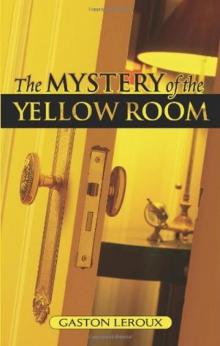 The Mystery of the Yellow Room
The Mystery of the Yellow Room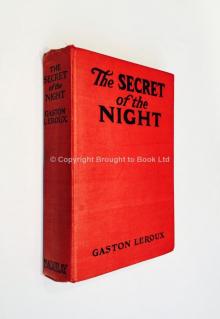 The Secret of the Night
The Secret of the Night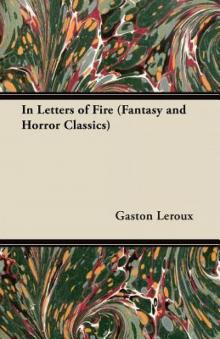 In Letters of Fire
In Letters of Fire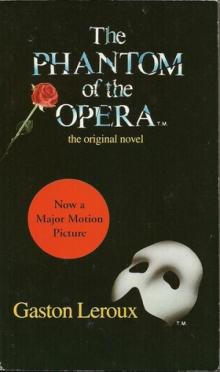 The Phantom of the Opera
The Phantom of the Opera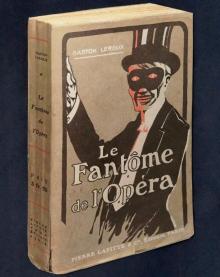 Fantôme de l'Opéra. English
Fantôme de l'Opéra. English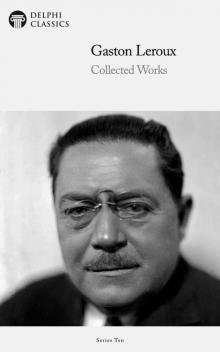 Collected Works of Gaston Leroux
Collected Works of Gaston Leroux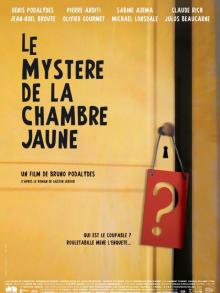 Le mystère de la chambre jaune. English
Le mystère de la chambre jaune. English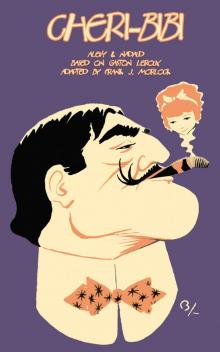 Cheri-Bibi: The Stage Play
Cheri-Bibi: The Stage Play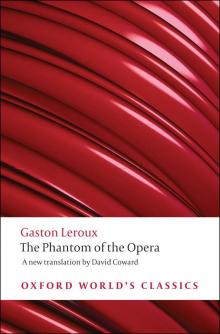 The Phantom of the Opera (Oxford World's Classics)
The Phantom of the Opera (Oxford World's Classics)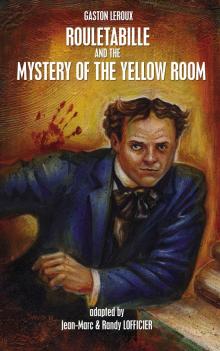 Rouletabille and the Mystery of the Yellow Room
Rouletabille and the Mystery of the Yellow Room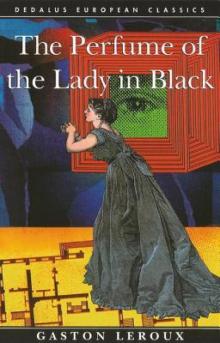 The Perfume of the Lady in Black
The Perfume of the Lady in Black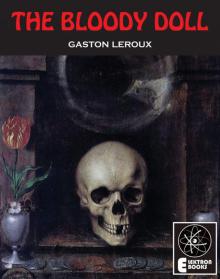 The Bloody Doll
The Bloody Doll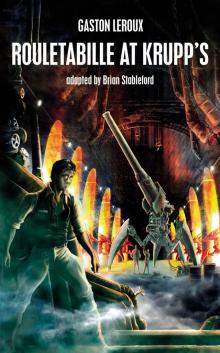 Rouletabille at Krupp's
Rouletabille at Krupp's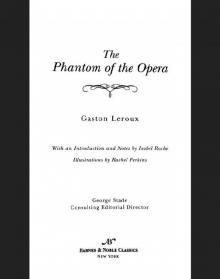 Phantom of the Opera (Barnes & Noble Classics Series)
Phantom of the Opera (Barnes & Noble Classics Series)